冀教版小学六年级英语总复习
冀教版六年级英语语法复习要点归纳
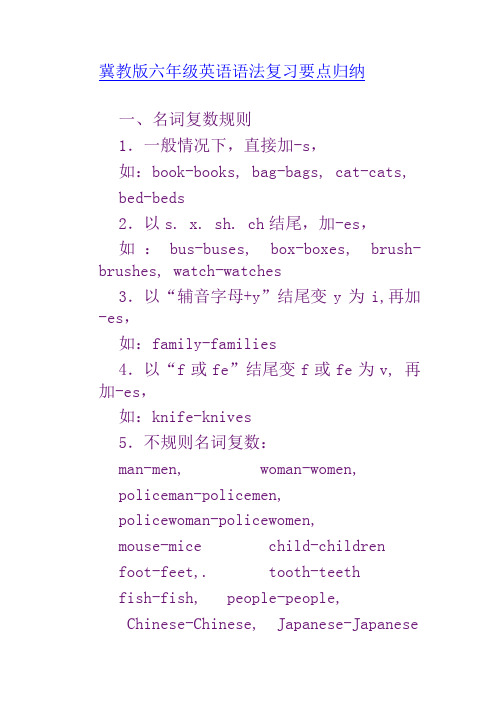
冀教版六年级英语语法复习要点归纳一、名词复数规则1.一般情况下,直接加-s,如:book-books, bag-bags, cat-cats,bed-beds2.以s. x. sh. ch结尾,加-es,如:bus-buses, box-boxes, brush-brushes, watch-watches3.以“辅音字母+y”结尾变y为i,再加-es,如:family-families4.以“f或fe”结尾变f或fe为v, 再加-es,如:knife-knives5.不规则名词复数:man-men, woman-women,policeman-policemen,policewoman-policewomen,mouse-mice child-childrenfoot-feet,. tooth-teethfish-fish, people-people,Chinese-Chinese, Japanese-Japanese二、一般现在时1.一般现在时表示经常或习惯性的动作,也可表示现在的状态或主语具备的性格和能力。
2.一般现在时中,没有be动词和情态动词,主语为第三人称单数的肯定句,动词要按规则加上s,主语是非第三人称单数的肯定句,动词用原形。
3.在一般现在时中,句中有be动词或情态动词时,否定句在be动词和情态动词后加not,一般疑问句将be动词或情态动词放在句首。
4.在一般现在时中,句中没有be动词或情态动词时,主语为第三人称单数的否定句在动词前加does+not (doesn’t),一般疑问句在句首加does,句子中原有动词用原形;主语为非第三人称单数,否定句用do+not (don’t),一般疑问句在句首加do,句子中动词用原形。
动词+s的变化规则1.一般情况下,直接加-s,如:cook-cooks, milk-milks2 .以s. x. sh. ch. o结尾,加-es,如:guess-guesses, wash-washes, watch-watches, go-goes3.以“辅音字母+y”结尾,变y为i, 再加-es,如:study-studies三、现在进行时1.现在进行时表示现在正在进行或发生的动作,也可表示当前一段时间内的活动或现阶段正在进行的动作。
冀教版六年级英语上册知识点总结
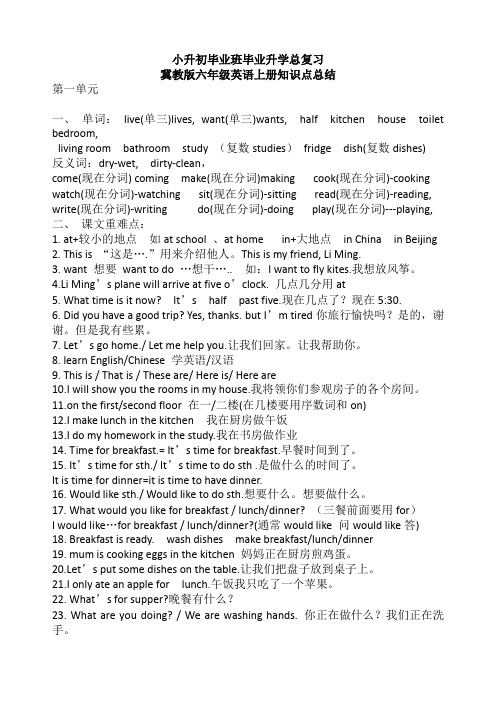
小升初毕业班毕业升学总复习冀教版六年级英语上册知识点总结第一单元一、单词:live(单三)lives, want(单三)wants, half kitchen house toilet bedroom,living room bathroom study (复数studies)fridge dish(复数dishes)反义词:dry-wet, dirty-clean,come(现在分词) coming make(现在分词)making cook(现在分词)-cooking watch(现在分词)-watching sit(现在分词)-sitting read(现在分词)-reading, write(现在分词)-writing do(现在分词)-doing play(现在分词)---playing,二、课文重难点:1. at+较小的地点如at school 、at home in+大地点in China in Beijing2. This is “这是….”用来介绍他人。
This is my friend, Li Ming.3. want 想要want to do …想干….. 如:I want to fly kites.我想放风筝。
4.Li Ming’s plane will arrive at five o’clock. 几点几分用at5. What time is it now? It’s half past five.现在几点了?现在5:30.6. Did you have a good trip? Yes, thanks. but I’m tired你旅行愉快吗?是的,谢谢。
但是我有些累。
7. Let’s go home./ Let me help you.让我们回家。
让我帮助你。
8. learn English/Chinese 学英语/汉语9. This is / That is / These are/ Here is/ Here are10.I will show you the rooms in my house.我将领你们参观房子的各个房间。
六年级知识点归纳总结英语冀教版

六年级知识点归纳总结英语冀教版在六年级学习英语过程中,我们接触了许多知识点,包括词汇、语法、阅读理解等。
下面对这些知识点进行一个综合归纳总结,以帮助大家更好地复习和回顾。
一、词汇1. 动词时态:我们学习了一般现在时、一般过去时和一般将来时的用法。
- 一般现在时表示经常性、习惯性或现在的状态。
- 一般过去时表示过去发生的动作或存在的状态。
- 一般将来时表示将来发生的动作或存在的状态。
2. 名词单复数:我们学习了名词的单数和复数形式的构成规则。
- 名词一般在词尾加-s构成复数形式。
- 以-s、-sh、-ch、-x结尾的名词,复数形式在词尾加-es。
- 以辅音字母+y结尾的名词,复数形式变y为i,再加-es。
3. 介词短语:我们学习了一些常见的介词短语的用法,如in front of、on the left、at the back等。
4. 数词:我们掌握了基数词和序数词的读法和用法,并学会了表示日期和年龄的表达方式。
二、语法1. 一般疑问句:我们学习了构成一般疑问句的方法,即将助动词或be动词提到句首。
- Can you swim?(你会游泳吗?)- Is she a teacher?(她是老师吗?)2. 选择疑问句:我们学习了构成选择疑问句的方法,即在句末使用or not。
- Do you like apples or not?(你喜欢苹果还是不喜欢?)- Is he from Beijing or not?(他是不是来自北京?)3. 情态动词:我们学习了情态动词can、could、may、might、must、shall、should、will、would等的用法。
- Can I go to the restroom, please?(我可以去洗手间吗?)- You should listen to your parents.(你应该听父母的话)4. 定语从句:我们掌握了定语从句的构成和用法,即用关系词(who、whom、whose、which、that)来引导从句。
2019-2020学年冀教版英语六年级第一学期全册期末复习资料
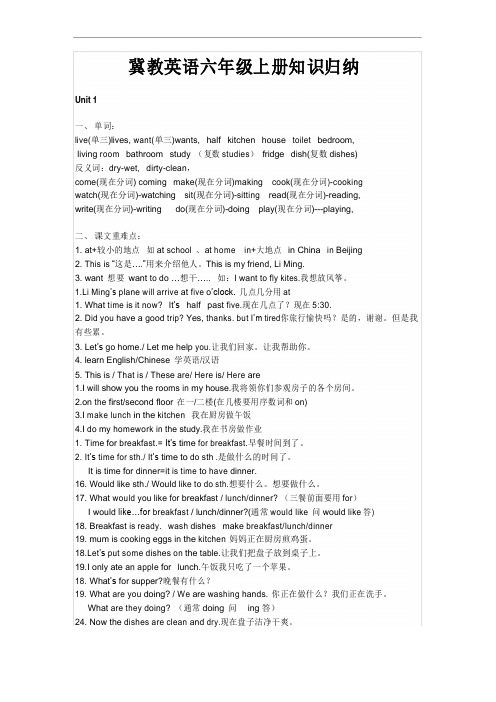
冀教英语六年级上册知识归纳Unit 1一、单词:live(单三)lives, want(单三)wants,half kitchen house toilet bedroom,living room bathroom study(复数studies)fridge dish(复数dishes)反义词:dry-wet,dirty-clean,come(现在分词)coming make(现在分词)making cook(现在分词)-cookingwatch(现在分词)-watching sit(现在分词)-sitting read(现在分词)-reading,write(现在分词)-writing do(现在分词)-doing play(现在分词)---playing,二、课文重难点:1. at+较小的地点如at school、at home in+大地点in China in Beijing2. This is“这是….”用来介绍他人。
This is my friend, Li Ming.3. want想要want to do…想干…..如:I want to fly kites.我想放风筝。
1.Li Ming’s plane will arrive at five o’clock.几点几分用at1. What time is it now?It’s half past five.现在几点了?现在5:30.2. Did you have a good trip?Yes,thanks.but I’m tired你旅行愉快吗?是的,谢谢。
但是我有些累。
3. Let’s go home./ Let me help you.让我们回家。
让我帮助你。
4. learn English/Chinese学英语/汉语5. This is /That is/ These are/Here is/Here are1.I will show you the rooms in my house.我将领你们参观房子的各个房间。
小学六年级英语总复习资料(冀教版)

小学六年级英语总复习资料(冀教版)字母英语是拼音文字,字母是英语的最小书写单位。
英语单词是由26个字母拼成的。
因此,掌握好每个字母的发音和书写是学好英语的最基本条件。
一、英语字母在字母表中的顺序:AaBbccDdEeFfGgHhlijjLINnooPpQqRrSsTtUuVvXxyyZz二、英语字母的书写规则:三、大写字母的作用:写句子时,句子中的个词的个字母要大写。
如:hat ' sthis?It ' saboo.专用名词的个字母要大些。
如:Liing,Danny,jenny,i,Beijing,china,canada,r.rs.iss,classone,GradeSix,Unitone.表示“我”的字母“ I ”无论是首字母还是在句子中间,永远要大写。
女口:laastudent.youandlaretelveyearsold.四、英语字母的分类:1.按字母的类型可以分为:元音字母、辅音字母和半元音字母。
在26个字母中Aa,Ee,Ii,oo,Uu 是元音字母,和yy是半元音字母,其他19个字母是辅音字母。
2.按字母的读音分为以下7类:含[ei]的字母:AaHhjj 含[i:]的字母:EeBbccDdGgPpTtVv含[e]读音的字母:FfLINnSsXxZz 含[ai]的字母:liyy 含[ju:]的字母:UuQqooRr五、常用英语缩略语:ccTVcAAcUNUUSUSAPRcUFoTocBANBAcc DIDPcFcABc字母专项练习题一、按字母顺序默写出26个字母的大、小写形式,并写出5个元音字母。
个元音字母是二、写出下列字母的左邻右舍。
1.Dd2.Ss3.Ffli5.oo6.7.Rrjj9.LI10.Xx三、把全是元音字母的一组字母圈出来。
1.ace2.ieo3.vu4.euljBI6.ETV7.olE8.AER9.Qyr10.AUE四、根据要求写字母。
写出含有字母“ A”读音的大小写字母:Aa写出含有字母“ E”读音的大小写字母:Ee个字母是辅音字母。
冀教版小学六年级上册英语总复习资料

冀教版小学六年级上册英语总复习资料六年级的孩子即将要进行期末考试了,那么在这个阶段,同学们应该怎样进行有效的英语复习呢?下面是由店铺整理的冀教版小学六年级上册英语总复习资料,希望对您有用。
冀教版小学六年级上册英语总复习资料第一部分一、英语字母在字母表中的顺序:Aa Bb Cc Dd Ee Ff Gg Hh Ii Jj Kk Ll Mm NnOo Pp Qq Rr Ss Tt Uu Vv Ww Xx Yy Zz二、英语字母的书写规则:三、大写字母的作用:1.写句子时,句子中的第一个词的第一个字母要大写。
如:What’s this? It’s a book.2.专用名词的第一个字母要大些。
如:Li Ming, Danny, Jenny, Kim, Beijing, China, Canada, Mr. Mrs. Miss, Class One, Grade Six, Unit One.3.表示“我”的字母“I”无论是首字母还是在句子中间,永远要大写。
如:I am a student. You and I are twelve years old.四、英语字母的分类:1. 按字母的类型可以分为:元音字母、辅音字母和半元音字母。
在26个字母中Aa, Ee, Ii, Oo, Uu是元音字母,Ww和Yy是半元音字母,其他19个字母是辅音字母。
2. 按字母的读音分为以下7类:(1)含[ei]的字母:Aa Hh Jj Kk(2)含[i:]的字母:Ee Bb Cc Dd Gg Pp Tt Vv(3)含[e]读音的字母:Ff Ll Mm Nn Ss Xx Zz(4)含[ai]的字母: Ii Yy(5)含[ju:]的字母: Uu Qq Ww(6)Oo(7)Rr五、常用英语缩略语:a.m.(上午) p.m.(下午) dm(分米) cm(厘米) mm(毫米) kg(千克) km(千米) B.C.(公元前) A.D.(公元) TV(电视) CCTV(中国中央电视台) CAAC(中国民航) UN(联合国) UK(英国) US(美国) USA(美国) PRC(中华人民共和国) UFO(不明飞行物) WTO(世界贸易组织) CBA(中国篮球职业协会) NBA(美国篮球职业协会) WC(厕所) CD(光盘) ID(身份证) PC(个人电脑) KFC(肯德基) ABC(基础知识)。
冀教版英语六年级上册知识点总结(期末复习资料)
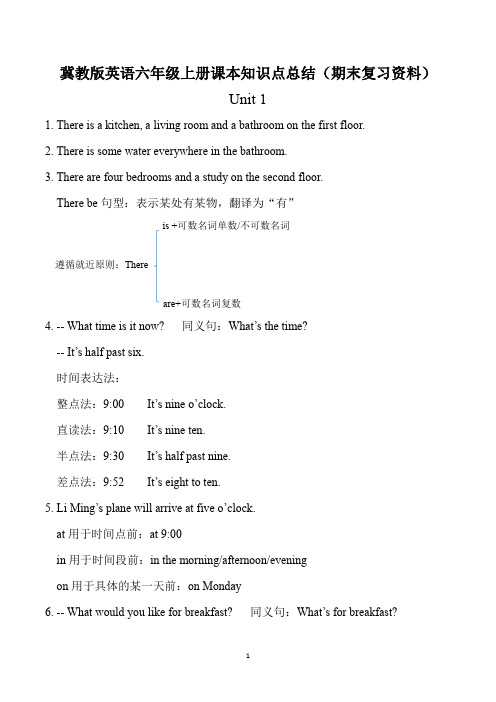
冀教版英语六年级上册课本知识点总结(期末复习资料)Unit 11. There is a kitchen, a living room and a bathroom on the first floor.2. There is some water everywhere in the bathroom.3. There are four bedrooms and a study on the second floor.There be句型:表示某处有某物,翻译为“有”is +可数名词单数/不可数名词遵循就近原则:Thereare+可数名词复数4. -- What time is it now? 同义句:What’s the time?-- It’s half past six.时间表达法:整点法:9:00 It’s nine o’clock.直读法:9:10 It’s nine ten.半点法:9:30 It’s half past nine.差点法:9:52 It’s eight to ten.5. Li Ming’s plane will arrive at five o’clock.at用于时间点前:at 9:00in用于时间段前:in the morning/afternoon/eveningon用于具体的某一天前:on Monday6. -- What would you like for breakfast? 同义句:What’s for breakfast?-- I'd( I would) like some eggs, bread and juice, please.would like 提问,would like 回答。
7. It's time for breakfast.= It's time to have breakfast.(It's) time for +名词= (It's) time to +动词原形8. The potatoes and carrots are on the table.9. I wash the dirty dishes. You can dry them. Now the dishes are clean and dry.可数名词复数的变化规则:规则变化:①直接加s②以ch, sh, s, x,结尾的加es③以o结尾的有生命的加es, 无生命的加s④以辅音字母+y结尾的变y为i再加es④以f/fe 结尾的,变f、fe为v, 加es不规则变化:①单复数同形:中日爱吃鱼羊鹿②改变中间元音:男人女人a变e,鹅足牙齿oo变ee③child后面加ren, ox后面加en, 老鼠变成冰老鼠10. Mum is cooking eggs in the kitchen.11. -- What are you doing?-- I am writing a letter.12. Jenny is sitting in a chair and Danny is sitting beside her.现在进行时:结构:主语+be +V-ing + 其他be动词用法规则:我用am,你用are,is 连着他她它,单数is复数areV -ing 变化规则:①直接+ing②哑e 结构,去e 加ing③汉堡结构(辅元辅结构)双尾加ing 注意:be +V -ing 两者缺一不可。
专题3 冀教版英语六年级上册专项复习
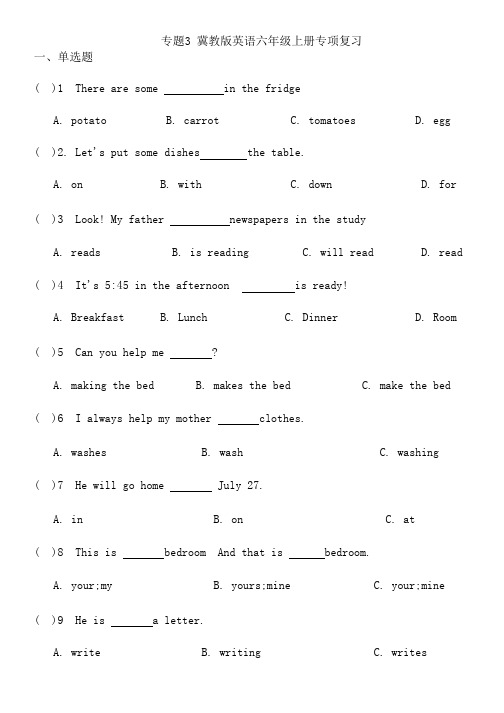
专题3 冀教版英语六年级上册专项复习一、单选题( )1 There are some in the fridgeA. potatoB. carrotC. tomatoesD. egg ( )2. Let's put some dishes the table.A. onB. withC. downD. for ( )3 Look! My father newspapers in the studyA. readsB. is readingC. will readD. read ( )4 It's 5:45 in the afternoon is ready!A. BreakfastB. LunchC. DinnerD. Room ( )5 Can you help me ?A. making the bedB. makes the bedC. make the bed ( )6 I always help my mother clothes.A. washesB. washC. washing ( )7 He will go home July 27.A. inB. onC. at( )8 This is bedroom And that is bedroom.A. your;myB. yours;mineC. your;mine ( )9 He is a letter.A. writeB. writingC. writes( )10 The are in the fridgeA. tomatoB. tomatosC. tomatoes ( )11. Let's help my mother dinner.A. makesB. of makeC. make ( )12 Where is Li Ming?A. I see he!There him isB. I see him! There his is!C. I see him! There he is!( )13 I would like some breadA. What would you like for breakfast?B. What would you like to breakfast?C. What would you like of breakfast?( )14 When will Jenny's plane arrive?A. Jenny’s plan e arrive in 8:00.B. Jenny's plane arrive on 8:00.C. Jenny's plane arrive at 8:00.( )15 What would Jam like?A. Jam would like a new, big car.B. Jam would like a big, new car.C. Jam would like a big, old car.( )16 He is our English teacher We all likeA. hisB. himC. he( )17 cards are on the chairA.She'sB. SheC. Her( )18 She is to give me a bookA. goesB. goC. going( )19 I will write a to my mother if I miss herA. letterB. newspapersC. giftsD. email( )20 What time is it?A. It is late.B. It's seven o'clock.C. It is time for class. ( )21 There a big bed and two plants in the roomA. isB. haveC. areD. has( )22 Let's clean the floor Don't make it againA. dirtyB. healthyC. littleD. well( )23 I'm thirsty Please give so me waterA. 1B.myC.me( )24. It's half past six. Time breakfast.A. ofB. forC. in( )25 Look!She is on the chairA. sitingB. sitsC. sittingD. to sit( )26 We wash in the sink(水槽)A. dishB. dishsC. dishes( )27 Mum eggs on the stove nowA. cooksB. cookingC. is cooking ( )28 What would you like supper?A.toB.forC.in。
冀教版六年级英语第一单元知识点总结

六年级英语(上)Unit One 总结复习一、词汇:形容词:clean ( 干净的) dirty (脏的)房间、家具的名词:bathroom(浴室)bathtub(浴缸)dishes(盘子)kitchen(厨房)living room(起居室,客厅)refrigerator(冰箱)room(房间)shower(淋浴)sink(水槽,洗涤槽)stove(炉子,炉灶)toilet(抽水马桶)物主代词:mine我的(东西)yours 你的(东西)及物动词:cook(做饭) dry(擦干)make(做)wash(洗)二、短语:at the airport(在飞机场)live in(居住)want to ( 想要) go to school(去学校)learn English(学英语)go home ( 回家) in the kitchen(在厨房)in the bathroom(在浴室)in the living room ( 在客厅) need to(需要)wash hands(洗手)wash face(洗脸)dry face(擦干脸)comb hair(梳头)brush teeth(刷牙)take a shower(洗淋浴)take a bath(洗盆浴)make supper / breakfast / lunch(做晚饭/早饭/午饭)help sb. do sth.(帮助某人做某事)wash (the )dishes(洗盘子)on the stove(在炉子上)in the refrigerator(在冰箱里)on the table(在桌子上)in the sink(在水槽里)watch TV (看电视)what else(其他什么)read the newspaper(看报纸)in the corner(在角落里)have fun(玩的开心)look at (看)三、标准句型:1.What time is it ? It’s __________. 现在几点了?_____________2.What would you like for______( breakfast, lunch, supper )?I would like __________(food).早饭/午饭/晚饭你喜欢吃点什么?我来点____________。
冀教版小学英语六年级毕业总复习资料短语句子

冀教版小学英语六年级毕业总复习资料短语句子集团标准化工作小组 [Q8QX9QT-X8QQB8Q8-NQ8QJ8-M8QMN]①play badminton打羽毛球②always do your homework总是做家庭作业③dry the dishes after supper晚饭后擦干盘子④at the sports store在运动品专卖店⑤make lunch做午饭⑥last week上周⑦ before/after breakfast⑧once a year一年一次⑨ wake up 起床⑩ twice a month一月两次(11)lie on the grass躺在草地上(12) in the sky 在天空 fly in the sky 在天空飞(13) fly a kite 放风筝 make a kite 制作风筝 (14) in summer在夏天(15) the different seasons 不同的季节(16) green leaves 绿色的树叶(17) wear sandals 穿凉鞋(18) brush my teeth刷牙(19) go swimming 去游泳(20) this afternoon 今天下午(21)in the morning/ afternoon / evening在早晨/在下午/在晚上(22)take off脱下 (23)put on穿上(24) stand up站起来(25)hurry up快点(26)jump in跳入(27)look at flowers看花 (28)call him on the phone 给他打电话(29) go on a trip一次旅行go on trips旅行(30)on the beach在海滩上(31) in the ocean在海洋里(32)in the lake在湖里(33)in summer holiday 在暑假(34)look like 看上去像(35)surprise party惊喜派对 (36)have a party举行一次晚会(37) at the airport在机场 (38) be good for 对…有好处.(39)an hour一小时(40at the gym在体育馆(41) play with 和…一起(42)arrive at到达(43 be ready to 为…做准备(44)atthe door在门口(45)ride a bike/by bike骑自行车(46) would like to想干什么(47)be late迟到(48)want to想要干什么(49)like to喜欢干什么(50) watch the game 观看比赛动词原形及过去式buy----bought(买) teach----taught(教) think----thought(想) win-----won(赢) do----did (做) lose----lost(丢失)throw----threw(扔) swim----swam(游泳) have----had (有)lie-----lay(躺)say------said(说)forget-----forgot(忘记) begin----bagin (开始)bring----brought (带来)eat----ate (吃)go-----went(去) is \am-----was are-----were(1) How far is Beijing? ---About nine thousandkilometers.北京有多远? ------大约九千公里。
冀教版,小学六年级英语,总复习大全资料

冀教版,小学六年级英语,总复习大全资料1.When choosing een a and an。
use an for words that begin with a vowel and use a for words that begin with a consonant.e is for singular and are for plural。
Use am for I and are for you.e has for singular and have for plural。
Use have for I and you.e there is for singular and there are for plural.e some for affirmative sentences and any for negative and ___.e what。
who。
where。
whose。
why。
when。
which。
how old。
how many。
and how much for n words.When comparing things。
___:Subject + verb to be (am。
is。
are) + comparative adjective + than + object。
such as:I'm ___.___.The comparative form of adjectives is formed by adding -er to the end of the adjective。
For adjectives that end in -e。
add -r。
For adjectives that end in -y。
change the y to an i and add -er。
For adjectives that end in a consonant-vowel-consonant pattern。
冀教版六年级英语知识点总结
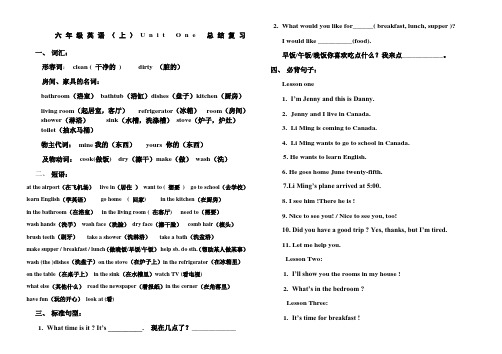
六年级英语(上)U n i t O n e总结复习一、词汇:形容词:clean ( 干净的) dirty (脏的)房间、家具的名词:bathroom(浴室)bathtub(浴缸)dishes(盘子)kitchen(厨房)living room(起居室,客厅)refrigerator(冰箱)room(房间)shower(淋浴)sink(水槽,洗涤槽)stove(炉子,炉灶)toilet(抽水马桶)物主代词:mine我的(东西)yours 你的(东西)及物动词:cook(做饭) dry(擦干)make(做)wash(洗)二、短语:at the airport(在飞机场)live in(居住)want to ( 想要) go to school(去学校)learn English(学英语)go home ( 回家) in the kitchen(在厨房)in the bathroom(在浴室)in the living room ( 在客厅) need to(需要)wash hands(洗手)wash face(洗脸)dry face(擦干脸)comb hair(梳头)brush teeth(刷牙)take a shower(洗淋浴)take a bath(洗盆浴)make supper / breakfast / lunch(做晚饭/早饭/午饭)help sb. do sth.(帮助某人做某事)wash (the )dishes(洗盘子)on the stove(在炉子上)in the refrigerator(在冰箱里)on the table(在桌子上)in the sink(在水槽里)watch TV (看电视)what else(其他什么)read the newspaper(看报纸)in the corner(在角落里)have fun(玩的开心)look at (看)三、标准句型:1.What time is it ? It’s __________. 现在几点了?_____________2.What would you like for______( breakfast, lunch, supper )?I would like __________(food).早饭/午饭/晚饭你喜欢吃点什么?我来点____________。
冀教版六年级下册英语总复习词 句子 短语复习资料
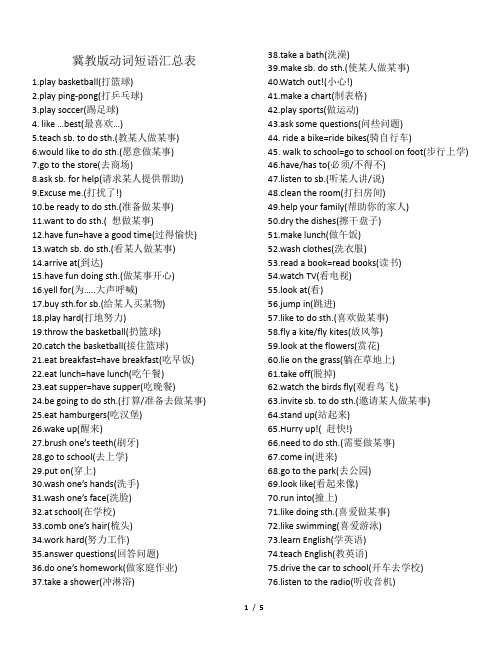
冀教版动词短语汇总表1.play basketball(打篮球)2.play ping-pong(打乒乓球)3.play soccer(踢足球)4. like …best(最喜欢…)5.teach sb. to do sth.(教某人做某事)6.would like to do sth.(愿意做某事)7.go to the store(去商场)8.ask sb. for help(请求某人提供帮助)9.Excuse me.(打扰了!)10.be ready to do sth.(准备做某事)11.want to do sth.( 想做某事)12.have fun=have a good time(过得愉快)13.watch sb. do sth.(看某人做某事)14.arrive at(到达)15.have fun doing sth.(做某事开心)16.yell for(为…..大声呼喊)17.buy sth.for sb.(给某人买某物)18.play hard(打地努力)19.throw the basketball(扔篮球)20.catch the basketball(接住篮球)21.eat breakfast=have breakfast(吃早饭)22.eat lunch=have lunch(吃午餐)23.eat supper=have supper(吃晚餐)24.be going to do sth.(打算/准备去做某事)25.eat hamburgers(吃汉堡)26.wake up(醒来)27.brush one’s teeth(刷牙)28.go to school(去上学)29.put on(穿上)30.wash one’s hands(洗手)31.wash one’s face(洗脸)32.at school(在学校)b one’s hair(梳头)34.work hard(努力工作)35.answer questions(回答问题)36.do one’s homework(做家庭作业)37.take a shower(冲淋浴) 38.take a bath(洗澡)39.make sb. do sth.(使某人做某事)40.Watch out!(小心!)41.make a chart(制表格)42.play sports(做运动)43.ask some questions(问些问题)44. ride a bike=ride bikes(骑自行车)45. walk to school=go to school on foot(步行上学)46.have/has to(必须/不得不)47.listen to sb.(听某人讲/说)48.clean the room(打扫房间)49.help your family(帮助你的家人)50.dry the dishes(擦干盘子)51.make lunch(做午饭)52.wash clothes(洗衣服)53.read a book=read books(读书)54.watch TV(看电视)55.look at(看)56.jump in(跳进)57.like to do sth.(喜欢做某事)58.fly a kite/fly kites(放风筝)59.look at the flowers(赏花)60.lie on the grass(躺在草地上)61.take off(脱掉)62.watch the birds fly(观看鸟飞)63.invite sb. to do sth.(邀请某人做某事)64.stand up(站起来)65.Hurry up!( 赶快!)66.need to do sth.(需要做某事)e in(进来)68.go to the park(去公园)69.look like(看起来像)70.run into(撞上)71.like doing sth.(喜爱做某事)72.like swimming(喜爱游泳)73.learn English(学英语)74.teach English(教英语)75.drive the car to school(开车去学校)76.listen to the radio(听收音机)77.go on a trip/go on trips(去旅行)78.fly home (乘飞机回家)79.say hello to sb.(向某人问好)80.call sb. on the phone(给某人打电话)81.walk slowly(走得慢)82. walk quickly(走得快)83.play cards(打牌)84.arrive in(到达)85.go for a walk(散步)86.walk down the street(沿着街走)87.take a picture=take pictures(拍照)88.go shopping(购物)89.get wet(变湿)90.be/get ready for(为……做好准备)91.make a snowman=make snowmen(堆雪人)92.Look out!(小心)93.walk forwards/backwards(向前走/向后走)94.turn around(转圈)95. all down(摔倒)96.flowers bloom(花开)e on (过来/加油!)98.blow…off(把……从……上吹落))99. look out the window(朝窗子外面看) 100.go inside(进来)101.go outside(出去)102.put up(装扮)103.send a card/send cards(寄贺卡)104.sing a song/sing songs(唱歌)105.bring gifts(带来礼物)106. walk to the park(步行去公园)107.eat eggs(吃鸡蛋)108.bring toys(带来玩具)109.help sb. with sth.(某人做某事)110.Christmas gifts(圣诞礼物)冀教版教材同音词汇总记忆表buy(买)-by(乘……)-bye(再见)two(二)-too(也)-to(到) I(我)-eye(眼睛)four(四)-for(为了)hi(嘿)-high(高)know(知道)-no(不)hear(听见)-here(这儿)their(他们的)-there(那儿)meet(碰见)-meat(肉)sun(太阳)-son(儿子)see(看见)-sea(大海)hour(小时)-our(我们的)write(写)-right(右面的/正确的)weak(虚弱的)-week(周)new(新的)-knew(know的过去式)one(一)-won(win的过去式)aren’t(are和not的缩写)-aunt(婶/舅/姑/姨母) its(它的)-it’s(it和is的缩写)Miss(小姐)-miss(想念)May(五月)-may(可以)冀教版不规则动词过去式分类记忆a.完全不规则:am,is-was, are-were, do/does-did, go-went, see-saw, say-said, have/has-had, fly-flew, speak-spoke, buy-bought, bring-brought, think-thought, teach-taught, eat-ate, lie-lay, can-could, will-would.b.改变其中的元、辅音字母:give-gave, get-got, forget-forgot, come-came, run-ran, sing-sang, write-wrote, draw-drew, drink-drank, ride-rode, swim-swam, shine-shone, find-found, win-won, lose-lost, make-made.c.原形和过去式同形:read-read, put-put,hit-hit, hurt-hurt, cost-cost.冀教版教材对应词和反义词汇boy(男孩)-girl(女孩)man(男士)-woman(妇女)brother(兄弟)-sister(姐妹)father(父亲)-mother(母亲)dad(爸爸)-mum(妈妈)uncle(叔叔)-aunt(婶婶) husband(丈夫)-wife(妻子)day(白天)-night(夜晚)morning(早上)-afternoon(下午) east(东方)-west(西方)north(北方)-south(南方)big(大的)-small(小的)old(旧的)-new(新的)old(老的)-young(少的)tall(高的)-short(矮的)long(长的)-short(短的)left(左面)-right(右面)wrong(错误的)-right(正确的) black(黑色的)-white(白色的) good(好的)-bad(坏的)happy(高兴地)-sad(悲伤的)dirty(脏的)-clean(干净的)heavy(重的)-light(轻的)hungry(饥饿的)-full(饱的)cold(冷的)-hot(热的)warm(温暖的)-cool(凉爽的)fat(胖的)-thin(瘦的)dry(干的)-wet(湿的)hard(难的)-easy(容易得)quiet(安静的)-loud(大声的) quick(快的)-slow(慢的)far(远的)-near(近的)high(高的)-low(低的)strong(强壮的)-weak(虚弱的) healthy(健康的)-sick(有病的) different(不同的)-same(相同的) expensive(昂贵的)-cheap(便宜的) here(这儿)-there(那儿)late(迟的)-early(早的)first(首先)-finally(最后)always(总是)-never(从来不) inside(里面)-outside(外面)up(向上)-down(向下)quickly(快地)-slowly(慢地)quietly(安静地)-loudly(大声地)well(好)-badly(坏)fast(快的、快地)-slow(慢的)/slowly(慢地) this(这个)-that(那个)these(这些)-those(那些)come(来)-go(去)yes(是)-no(不是)stand(站)-sit(坐)open(打开)-close(关上)ask(问)-answer(答)borrow(借来)-lend(借出)bring(带来)-take(带走)buy(买)-sell(卖)cry(哭)-laugh(笑)teach(教)-learn(学)better(更好)-worse(更坏)before(在……之前)-after(在……之后) above(在……以上)-below(在……以下)冀教版常用交际用语汇总记忆表问候:Hi! Hello! Goodmorning/afternoon/evening! Nice to meet you! Nice to meet you, too.A:How are you? B: Fine, thank you./Very well, thank you.介绍:My name is ____. / I am a student. / I’m from Canada. /This is ______.告别:Good-bye! /Bye! /Bye-bye! Good night! See you later /tomorrow!感谢:-Thank you(very much)/ Thanks a lot. -That’s OK. / That’s All right. / You are welcome. / Not at all.道歉:-Sorry. / I am sorry. -That’s OK. / It’s all right.邀请:-Would you like to go for a walk? / Will/Would you come to my birthday party?-Sure. / No, thanks.请求允许:-May I go on a trip to Beijing?-Yes, you may. / No, you may not. / Sure. / Certainly. -Can I use your pencil?-Of course, you can.祝愿与祝贺:Have a lovely day! / Good luck! / Happy New Year! / Merry Christmas!You, too. / The same to you. -Happy birthday!-Thank you.约会:A:Would you like to play with me this afternoon? B: Yes. When? A:At 12:00.B: See you then.打电话:A:Hello! May I speak to Mr. Wood? B:Yes, just a moment, please.A:Hello! Is Kim there? B:No /Sorry, can I take a message.就医:A:What’s the matter?/What’s wrong with you? B:I hurt my finger. I have a headache/stomachache.就餐:A:Would you like something to eat / drink? B: Yes. I would like rice and chicken.A:What would you like?B:I would like some tea.A:Would you like some more dumplings?B:Yes, please. / No, thanks / thank you.A:May I have some more soup?B:It’s delicious. Sure / OK.购物:A:Can/May/I help you?B: Yes. I want to buy a dress, please.A:Here you are.B: May I try it on?A:Ok/Sure.B: It’s too big/small.A:This one is just right.B: How much is it/ are they?A:One hundred yuan /dollars.B: It’s too expensive. /It’s very cheap. But I like it. I’ll take it.问路:A:Excuse me. Do you know where isthe________?B: Yes. Go straight down the street. Turn left /turn right.提供帮助:A: Can I help you? /May I help you? B: Yes, please. / No, thanks.询问对方姓名:A:What’s your name?B:My name is ____.A:What’s his/ her name?B: His /her name is ___.A:Who are you?B: I’m _____.询问在那儿:A: Where is the book?B:It is on the desk.A:Where is Jenny?B:She is behind Danny.询问是什么:A:What is it?B: It is a marker.询问颜色:A:What colour is the sweater?B:It is black.询问时间:A:What time is it?B: It’s seven.A:When is Teachers’Day?B: It’s on September tenth.询问地址和住址:A:Where are you from?B: I’m from Canada.A:What’s your address?B: My address is 111 Park Road.A:Where do you live?B: I live in an apartment.询问日期:A:What day is today?B: It’s Monday.A:What day is tomorrow?B: It’s Tuesday.A:What day was yesterday?B: It was Sunday.A:What’s the date?B: It’s October 19th.询问对方正做什么:A: What are you doing?B: I’m writing a letter.A:What is he/ she doing?B: He /she is playing.A:What are they doing?B: They are learning English.询问对方做过些什么:A: What did you do?B: I went to the gym.A:What did they do?B: They played basketball.询问对方将要做什么:A:What will you do?B: I will fly a kite.A:What is he going to do?B: He is going to learn English.询问对方最喜欢的事物:A:What’s your favourite colour /food / fruit /shape/ season?B: My favourite colour is white.询问数量:A:How many pencils do you have? B: I have 10 pencils.A:How many birds can you see?B: I can see 20 birds.A:How many days are there in a week?B: There are seven days in a week.询问价钱:A:How much is the scarf?B: Twenty yuan.A:How much are the runners?B: They are thirty dollars.谈论天气气温:A:How’s the weather today?B: It’s sunny/cloudy/windy/snowy.A:What’s the temperature?B: It’s _______degrees.询问年龄:A:How old are you?B:I’m fourteen years old.A:How old is she/ he?B: He/ She is twenty .询问身高:A:How tall are you?B: I’m 1.6 meters tall.A:How tall is she/ he?B: She/ he is 1.7 meters tall.询问事情发生的频率:A:How often do you play basketball?B: About once a week.A:How often does my mother clean my bedroom? B: Twice a day.询问事情距离长短:A:How long is the trip? B: About two hours to Beijing.A:How long does he go to school a day ?B: Eight hours.询问路程的远近:A:How far is it from here to Beijing?B: It’s one hundred kilometers.询问对方感觉怎么样: A:How do you feel?B: I feel sad.询问对方是谁,问谁在做些什么?A:Who is this? B: This is a man.A:Who is talking? B: Danny is talking.询问东西是谁的:A:Whose hat is this?B: This is my hat /mine.询问原因:A: I like to eat vegetables. Why?B:Because it’s good for your health.。
- 1、下载文档前请自行甄别文档内容的完整性,平台不提供额外的编辑、内容补充、找答案等附加服务。
- 2、"仅部分预览"的文档,不可在线预览部分如存在完整性等问题,可反馈申请退款(可完整预览的文档不适用该条件!)。
- 3、如文档侵犯您的权益,请联系客服反馈,我们会尽快为您处理(人工客服工作时间:9:00-18:30)。
一:学生易错词汇1. a, an的选择: 元音字母开头的单词用an,辅音字母开头的单词用 a.2. am , is , are的选择: 单数用is , 复数用are. I 用am , you 用are.3. have , has 的选择: 表示某人有某物.单数用has , 复数用have. I ,you 用h a v e.4. there is, there are 的选择:表示某地有某物,某人.单数用there is , 复数用t h e r e a r e.5.s o m e,a n y的选择:肯定句用s o m e,疑问句和否定句用a n y.6. 疑问词的选择:what (什么) who (谁) where (哪里) whose (谁的) why(为什么)when(什么时候)which(哪一个)how old (多大) how many (多少)how m u c h(多少钱)二:形容词比较级详解当我们需要对事物作出比较时,需要用到比较级.比较级的句子结构通常是:什么+ 动词be (am , is , are ) + 形容词比较级+ than(比)+ 什么,如:I'm taller and heavier than you. (我比你更高和更重.)An elephant is bigger than a tiger. (一只大象比一只老虎更大.)形容词的比较级是在形容词的基础上变化而来的,它的变化规则是:①一般的直接在词尾加er ,如tall - taller , strong - stronger ,②以e结尾的,直接加r ,如fine – finer ,③以辅音字母加y结尾的,先改y为i再加er,如funny - funnier④双写最后的字母再加er,如big – bigger, thin – thinner ,hot – hotter☆注意☆比较的两者应该是互相对应的可比较的东西.典型错误:My hair is longer than you.(我的头发比你更长.)比较的两者是我的头发,你(整个人),那么比较的对象就没有可比性.应该改为:My hair is longer than yours. 或My hair is longer than your hair.比较级专项练习: 一,从方框中选出合适的单词完成句子heavy tall long big(1) How is the Yellow River(2) How is Mr Green He's 175cm.(3) How are your feet I wear size 18.(4)How is the fish It's 2kg.三:动词过去式详解动词的过去式的构成规则有:A,规则动词①一般直接在动词的后面加ed:如worked , learned , cleaned , visited②以e结尾的动词直接加d:如lived , danced , used③以辅音字母加y结尾的动词要改y为i再加ed(此类动词较少)如study –studied carry – carried worry – worried (注意play,stay不是辅音字母加y,所以不属于此类)④双写最后一个字母(此类动词较少)如stoppedB,不规则动词(此类词并无规则,须熟记)小学阶段要记住以下动词的原形和过去式:sing – sang , eat – ate , see – saw , have – had , do – did , go - went , take - took , buy - bought , get - got , read - read ,fly - flew , am/is - was ,are - were , say - said , leave - left , swim - swam , tell - told , draw - drew , come - came , lose - lost , find - found , drink - drank , hurt - hurt , feel - felt四:动词现在分词详解动词的ing形式的构成规则:①一般的直接在后面加上ing , 如doing , going , working , singing , eatin g②以e 结尾的动词,要先去e再加ing ,如having , writing③双写最后一个字母的(此类动词极少)有:running , swimming , sitting , gett ing五:人称代词与物主代词一、人称代词二、物主代词六:句型专项归类1.肯定句:是指用肯定的语气来陈述的句子,如:I'm a student. She is a doctor. He works in a hospital.There are four fans in our classroom. He will eat lunch at 12:00. I watched TV yesterday evening.2,否定句:含有否定词或表示否定意义词的句子,如:I'm not a student. She is not (isn't) a doctor.He does not (doesn't) work in a hospital. There are not (aren't) four fans in our classroom.He will not (won't) eat lunch at 12:00. I did not (didn't) watch TV yesterday evening.☆注意☆小结:否定句主要是在肯定句的基础上加上了否定词"not".有动词be 的句子则"not"加在be后面,可缩写成"isn't,aren't",但am not 一般都分开写.没有动词be的句子则要先在主要动词的前面加上一个助动词(do,does,did),然后在它后面加上"not",你也可以把它们缩写在一起如"don't , doesn't , didn't ).这三个助动词要根据人称和时态来选择,其中"does"只用于一般现在时主语是第三人称单数的情况,而"did"只用于一般过去时,不论主语是什么人称和数,都用"did" .3,一般疑问句:是指询问事实的句子,此类句子必须用"yes",或"no"来回答.如:Are you a student Yes, I am / No, I'm not.Is she a doctor Yes, she is. / No, she isn't.Does he work in a hospital Yes, he does. / No, he doesn't.Are there four fans in our classroom Yes, there are. / No, there aren't.Are you going to buy a comic book tonight Yes, I am. / No, I am not. (Yes, we are. / No, we aren't.)Will he eat lunch at 12:00 Yes, I will. / No, I will not(won't).Are they swimming Yes, they are. / No, they aren't.Did you watch TV yesterday evening Yes, I did. / No, I didn't.☆注意☆小结:一般疑问句是在肯定句的基础上,①把动词be调到首位,其他照写,末尾标点符号变成问号即可.②没有动词be的句子则要在句首加上一个助动词(do,does,did)再把紧跟在后面的动词变回原形,末尾标点符号变成问号即可.这三个助动词也要根据人称和时态来选择,其中"does"只用于一般现在时主语是第三人称单数的情况,而"did"只用于一般过去时,不论主语是什么人称和数,都用"did" .一般疑问句有个重要的原则就是问和答要一致,即问句里的第一个单词(助动词)和简略答句里的这个词是一致的.4,特殊疑问句:以特殊疑问词(what , where , who , which , when , whose , why , how等)开头引导的句子.此类句子应该问什么就答什么,不能用"yes ,no"来回答.如:What is this It's a computer.What does he do He's a doctor.Where are you going I'm going to Beijing.Who played football with you yesterday afternoon Mike.Which season do you like best Summer.When do you usually get up I usually get up at 6:30.Whose skirt is this It's Amy's.Why do you like spring best Because I can plant trees.How are you I'm fine. / I'm happy.How did you go to Xinjiang I went to Xinjiang by train.☆其中how又可以和其他一些形容词连用组成特殊疑问词组用来提问,如: how many(多少(数量)), how much(多少(钱)), how tall(多高), how long(多长), how big(多大), how heavy(多重)例句:How many pencils do you have I have three pencils.How many girls can you see I can see four girls.How many desks are there in your classroom There are 51.☆小结:how many 用来提问可数名词的数量,主要有以上三种句式搭配,How many + 名词复数+ do you have 你有多少……How many + 名词复数+ can you see 你能看见多少……How many + 名词复数+ are there… 有多少……七:完全,缩略形式: I'm=I am he's=he is she's=she is they're=they are you're=you are there's=there is they're=they are can't=can not don't=do not doesn't=does not isn't=is not aren't=are not let's=let us won't=will notI'll=I will wasn't=was not总结:通常情况下,'m即am,'s即is(但let's=let us), 're即are,n't即not (但can't=can not)八:小学英语词汇不完全归类表学习用品(school things):pen钢笔pencil铅笔pencil-case铅笔盒ruler尺子book书bag包comic book漫画书post card明信片newspaper报纸schoolbag书包eraser橡皮crayon蜡笔story-book故事书notebook笔记本Chinese book语文书English book英语书人体(body):foot(feet)脚head头face脸hair头发nose鼻子mouth 嘴eye眼睛ear耳朵arm手臂hand手finger手指leg腿tail尾巴颜色(colours):red红blue蓝yellow黄green绿white白black黑pink粉红purple紫orange橙brown棕动物(animals):cat猫dog狗pig猪duck鸭rabbit兔horse马elephant大象ant蚂蚁fish鱼bird鸟snake蛇mouse老鼠kangaroo袋鼠monkey猴panda熊猫bear熊lion狮子tiger老虎fox狐狸zebra斑马deer鹿giraffe 长颈鹿lamb小羊sheep绵羊goat山羊cow奶牛donkey驴人物(people):friend朋友boy男孩girl女孩mother母亲father父亲sister姐妹brother兄弟uncle叔叔;舅舅man男人woman女人Mr.先生Miss小姐mom妈妈dad爸爸parents父母grandparents 祖父母grandma/grandmother(外)祖母grandpa/grandfather(外)祖父aunt 姑姑cousin堂(表)兄弟;堂(表)姐妹son儿子daughter女儿baby婴儿children 儿童classmate同学queen女王student大学生people人物职业(jobs):teacher教师student学生doctor医生nurse护士driver司机farmer农民singer歌唱家writer作家actor男演员actress女演员artist画家TV reporter电视台记者policeman(男)警察cleaner清洁工police警察食品,饮料(food & drink):rice米饭bread面包beef牛肉milk牛奶water水egg蛋fish鱼cake蛋糕hot dog热狗hamburger汉堡包French fries炸薯条cookie曲奇饼干jam果酱noodles面条meat肉chicken鸡肉meat 肉mutton羊肉vegetable蔬菜soup汤ice冰ice-cream冰淇淋Coke可乐juice果汁tea茶coffee咖啡breakfast早餐lunch午餐dinner/supper晚餐水果,蔬菜(fruit & vegetables):apple苹果banana香蕉pear梨orange橙watermelon西瓜grape葡萄eggplant茄子green beans青豆tomato西红柿potato土豆peach桃strawberry草莓onion洋葱carrot胡萝卜cabbage卷心菜衣服(clothes):jacket夹克衫shirt衬衫T-shirt丅恤衫skirt短裙子dress连衣裙jeans牛仔裤pants长裤socks袜子shoes鞋子sweater毛衣coat上衣raincoat雨衣shorts短裤slippers拖鞋sandals凉鞋boots靴子hat(有沿的)帽子cap便帽sunglasses太阳镜scarf围巾gloves手套交通工具(vehicles):b ike自行车bus公共汽车train火车boat小船ship轮船car小汽车taxi出租车jeep吉普车truck卡车plane/airplane飞机杂物(other things): window窗户door门desk课桌chair椅子bed床computer计算机board写字板light灯teacher's desk讲台picture图画;照片photo照片wall墙壁floor地板closet壁橱end table床头柜football/soccer足球walkman随身听lamp台灯(on the)phone电话table桌子TV电视key钥匙lock锁chart 图表plate盘子knife刀spoon勺子chopsticks筷子gift礼物toy玩具doll洋娃娃ball球balloon气球kite风筝box盒子umbrella伞violin小提琴yo-yo溜溜球hole洞tube管子toothbrush牙刷e-mail电子邮件traffic light 交通灯money钱地点(locations):home家room房间bedroom卧室bathroom卫生间living room起居室kitchen厨房classroom教室school学校park公园library图书馆post office邮局police office警察局hospital医院bookstore书店farm 农场zoo动物园garden花园study书房playground操场teacher's office教师办公室library图书馆gym 体育馆washroom卫生间computer room计算机教室music room音乐教室TV room电视机房the Great Wall长城supermarket超市bank银行country 国家city城市bus stop公交车站国家,城市(countries & cities): China/PRC中国America/ the USA美国the UK/ England英国Canada/CAN加拿大Australia澳大利亚New York纽约London伦敦Sydney悉尼Moscow莫斯科Cairo开罗气象(weather):cold寒冷的warm温暖的cool凉爽的snowy下雪的sunny 晴朗的hot炎热的rainy下雨的windy有风的cloudy多云的weather report 天气预报景物(nature): river河流lake湖泊溪forest森林road公路house房子building建筑物rain雨cloud云sun太阳mountain山sky天空rainbow彩虹wind风air空气moon月亮植物(plants): flower花grass草tree树rose玫瑰leaf叶子( leaves复数)星期(week): Monday星期一Tuesday星期二Wednesday星期三Thursday 星期四Friday星期五Saturday星期六Sunday星期天weekend周末月份(months):Jan. (January)一月Feb.(February)二月Mar.(March)三月April四月May五月June六月July七月Aug.(August)八月Sept.(September)九月Oct.(October)十月Nov.(November)十一月Dec.(December)十二月季节(seasons): spring春summer夏fall/autumn秋winter冬方位south南north北east东west西left 左边right右边患病(illness):have a fever发烧hurt疼痛have a cold感冒have a toothache牙疼have a headache头疼数词(numbers): one一two二three三four四five五six六seven七eight 八nine九ten十eleven十一twelve十二thirteen十三fourteen十四fifteen 十五sixteen十六seventeen十七eighteen十八nineteen十九twenty二十thirty三十forty四十fifty五十sixty六十seventy七十eighty八十ninety九十forty-two四十二hundred百one/a hundred and thirty-six一百三十六first第一second第二third第三fourth第四fifth第五eighth第八ninth第九twelfth第十二twentieth第二十thirtieth第三十fortieth第四十fiftieth第五十sixtieth第六十seventieth第七十eightieth第八十ninetieth第九十fifty-sixth第五十六形容词(adj.): big大的(比较级bigger than更大的)small小的----smaller 更小的long长的---- longer更长的tall高的---- taller更高的short短的;矮的----shorter更矮high高的----higher更高的low低的young年轻的-----younger更年轻的new新的old旧的;老的-----older年龄更大的strong健壮的-----stronger更强壮的thin瘦的-----thinner更瘦的heavy重的-----heavier更重的light轻的---lighter更轻的quiet安静的nice好看的kind和蔼亲切的funny滑稽可笑的salt盐---salty 咸的favourite最喜爱的clean干净的tired疲劳的excited兴奋的good好的fine好的great很好的fat胖的sad忧愁的----happy快乐的高兴的right对的hungry饥饿的---- eat吃thirsty口渴的----- drink 喝lovely可爱的beautiful漂亮的colourful色彩鲜艳的pretty漂亮的cheap便宜的expensive昂贵的healthy健康的helpful有帮助的easy简单的sick 有病的better更好的介词(prep.):in在……里on在……上;在……时候under在……下面near 在……的旁边behind在……后边next to与……相邻abver在……上面in front of在……前面代词(pron.): I我we我们you你;你们he他she她it它they他(她,它)们my我的our 我们的your你的;你们的his他的her她的。
